It's my favorite for a number of reasons. First off, it's by far the best put together of the films. The directing is great, and every shot feels intentionally placed. The writing is solid - I give them a lot of credit for managing to make the film feel whole and complete even though it's actually only half of the original book. And the editing is superb. Seriously, this might be the best edited film I've ever seen, and yes, I'm including all those fancy movies from film school in that. This just had such perfect timing. I want to find the editor and take them out for drinks or something. It's that good.
The acting is, of course, excellent. That's no surprise, as the acting has always been the cornerstone of these movies (like it should be), but it's worth noting that Jennifer Lawrence is really doing Oscar level work here - she plays Katniss with a sensitivity and blunt fear that makes her amazing to watch. Her Katniss is a brutalized soldier with PTSD struggling to cope in a strange situation and terrified of any new change, and it's horrible and hard to watch. Which is a good thing. Also Josh Hutcherson makes good use of what little screentime he gets, and even Jena Malone, who gets about one shot, is still weirdly mesmerizing.
It's easy to dismiss that as a crass business decision - after all, you can make a lot more money off two movies than one - but I think in this rare case it's worked out for the best. The division allows the story time to grow and keeps this movie from being a big action movie jam-packed with set pieces and explosions and frenetic running.
Instead, what we got was a surprisingly contemplative movie about the nature of war and identity. I'm not saying that the movie is quiet - it really isn't - but rather that there are a lot of moments of quiet in between the noise, where Katniss is forced to sit back and reckon with what has been done to her. And those are the best moments.
The narrative of this film follows the first half of Mockingjay, the book. It starts with Katniss (Lawrence) in District 13, learning how to live again and deeply mourning the loss of Peeta (Hutcherson). When she was rescued in the arena, they left him behind and she has no idea what happened to him. Gale (Liam Hemsworth) and Prim (Willow Shields) try to help Katniss cope, but neither of them can relate or even really understand what Katniss is going through. The only one who might be able to - Haymitch (Woody Harrelson) - is gone, drying out in some facility. All she has is her family, and Plutarch Heavensbee (Phillip Seymour Hoffman), the gamemaker who got her out.
Plutarch and President Coin (Julianne Moore) didn't rescue Katniss for nothing. They have plans for her. Specifically, they want to use her visibility and penchant for symbolism to make her into the poster girl of the rebellion. Everyone is primed to accept her as The Mockingjay, the symbol of revolt against the Capitol. Everyone, except Katniss herself, who has no interest in doing this. She's tired. She wants to be done. And she wants Peeta.
But then the Capitol broadcasts an interview with Peeta where he begs for peace and openly mourns Katniss, and she can't keep quiet. Even more, they take her to the remains of District 12, and she decides she can't keep silent. She will be their Mockingjay, if they agree to pardon Peeta and the other Victors when they're rescued. Coin agrees to her terms, reluctantly, and Katniss becomes a symbol.
Of course, it's not as easy as that. Plutarch and Coin want Katniss to just stand in front of a greenscreen and give a rallying speech, but Katniss has never been much of an actor. In fact, the only reason people really liked Katniss the first time around was because Peeta made her super sympathetic. Or, as Haymitch points out, people like her for something she did that was unscripted. Like volunteering for Prim or mourning Rue. Katniss is at her best when no one is telling her how to live her life.
Plutarch and Coin figure they can use that, and decide to let Katniss just be herself. Within very strict and controlled parameters. So she can fly out to the stricken districts and visit the wounded, but she'll be kept on a short leash and filmed the whole time. This turns out better than anticipated when an ordinary visit to a District 8 hospital turns into a combat situation where Katniss shoots down a plane with an exploding arrow, delivers an off the cuff stirring speech, and bonds with a hospital full of desperate people.
Katniss the poster child is born.
The rest of the film cuts between Katniss the symbol of the rebellion and Katniss the exhausted PTSD patient. Either she's full of righteous fury and being filmed as she does something heroic or symbolic, or she's curled up in a ball in the tunnels, trying to forget she's alive. Her only moments to just be Katniss, human being, come when she's focused on someone else, like caring for Prim or comforting Gale. And even then, it's clear she's barely holding the strings together.
It's clear that this dichotomy is very intentional in the film. Katniss doesn't have the luxury of being herself, because she has no time in which to just exist. She's always on call to make more propoganda videos, and as much as the filmmakers like her (especially Cressida, played by Natalie Dormer, who is really interesting), she's still a subject of study. Even her unguarded moments, like her choice to sing an old (deeply creepy) song in District 12 become the fodder for more videos. Katniss' life is not her own. Her likeness and voice are not her own. She is all image, and she is owned.
In this movie, though, it's the ostensible good guys who are choosing to step all over Katniss' identity and existence. They're doing it for a good cause, I guess, but they're still subjecting Katniss to a dehumanizing process. After all, it's dehumanizing to debase someone and treat them like an animal. But it's also dehumanizing to strip them of humanity and treat them like an idol instead.
It doesn't help that this movie makes it clear revolution isn't nearly as sexy as it sounds. While the previous two movies build us up to a fervor, demanding war and action and a fight, this film buries us in images of horrific injuries, brutal decisions, and agonizing terror. War is not fun. It's bloody and messy and horrible. We're not allowed to forget that here. It's like the film is saying, "You wanted a revolution? Here you go. I hope it's what you were prepared for."
Since this is very much the message of the book, I felt quite happy with the interpretation here. That war is horrible no matter what side you're on, and that violence might be necessary, but it is never good. Scenes of the people rising up against their oppressors are always a little jarring. We've been conditioned to cheer at scenes like that in other movies, but here the image always shifts a little too quickly to Katniss' haunted face, and we're reminded that there can be no happy ending when violent means are used to effect change.
Perhaps that's why I, as a pacifist, like this movie so much. It's so unequivocally against war, while still making it clear that something needs to change. It doesn't try to moralize or give solutions, it just sort of shoves the whole mess in your face, as if to say, "Here. This is what you wanted, isn't it?"
Like I said above, though, there are more reasons I like this film than just the technical proficiency it displays. I love these themes, and I love that the movie makes it a priority to really unsettle its audience. Perhaps the most jarring moment in the film is when we see the full version of one of the propaganda videos Katniss has been filming.
It's good, clearly well done, but at the very end a giant title pops up on screen: Join the Rebellion! And it's done in the exact same font and style as the posters that advertise this movie. Like, literally. The marketing poster that we've been seeing everywhere? It's the propaganda poster of Katniss as the Mockinjay that District 13 is using to drum up support.
In other words, the film draws a clear correlation between Katniss as heroine of this movie and Katniss as a symbol of the revolution. It refuses to deny her complexity, and in so doing makes the audience pretty freaking uncomfortable. That's a good thing.
I also want to commend the film for its handling of a potential love triangle. While the Gale-Katniss-Peeta triad is talked about a lot in the media and promotion of the film, it's really not a big part of the story. We've been clear since the second movie who Katniss would choose. It's not that Gale's not nice and all, and he's clearly in love with Katniss, but he just doesn't get it. Katniss and Peeta are bound by love and shared experience. There is no one else in the world who can understand what they in particular have been through. There is no choice. And the movie really represents that. There's never a question given, and I appreciate that.
I have more to say on all of these things, but I guess I'll have to leave that for another article. It's a good sign that there are so many facets to this movie. It's not a dumb action movie at all, nor is it worth the denigration these movies sometimes face, where people complain about how shallow and stupid and "teenage girl" they all are. Shut up. This is a great movie and you know it.
I suppose I'll leave with this: the film is a meta-examination of how we understand narratives and how we process tragedy. Katniss is shown going through a very public mourning process, while she and her image are also used to promote a war she doesn't actually really want. More than that, we're shown how the people of Panem see these images and react. If the movie is about anything, I'd say it's about this.
About how we consume and process the media and the narrative we're given. And how maybe we should do a little more process and digging and thinking for ourselves. Because if we want to live in a world that really is free, we need to learn how to live without propaganda, without spin, without "prep teams." We need to learn how to accept the narrative that is already there, without creating one of our own.
Also the ending is brutal and great.

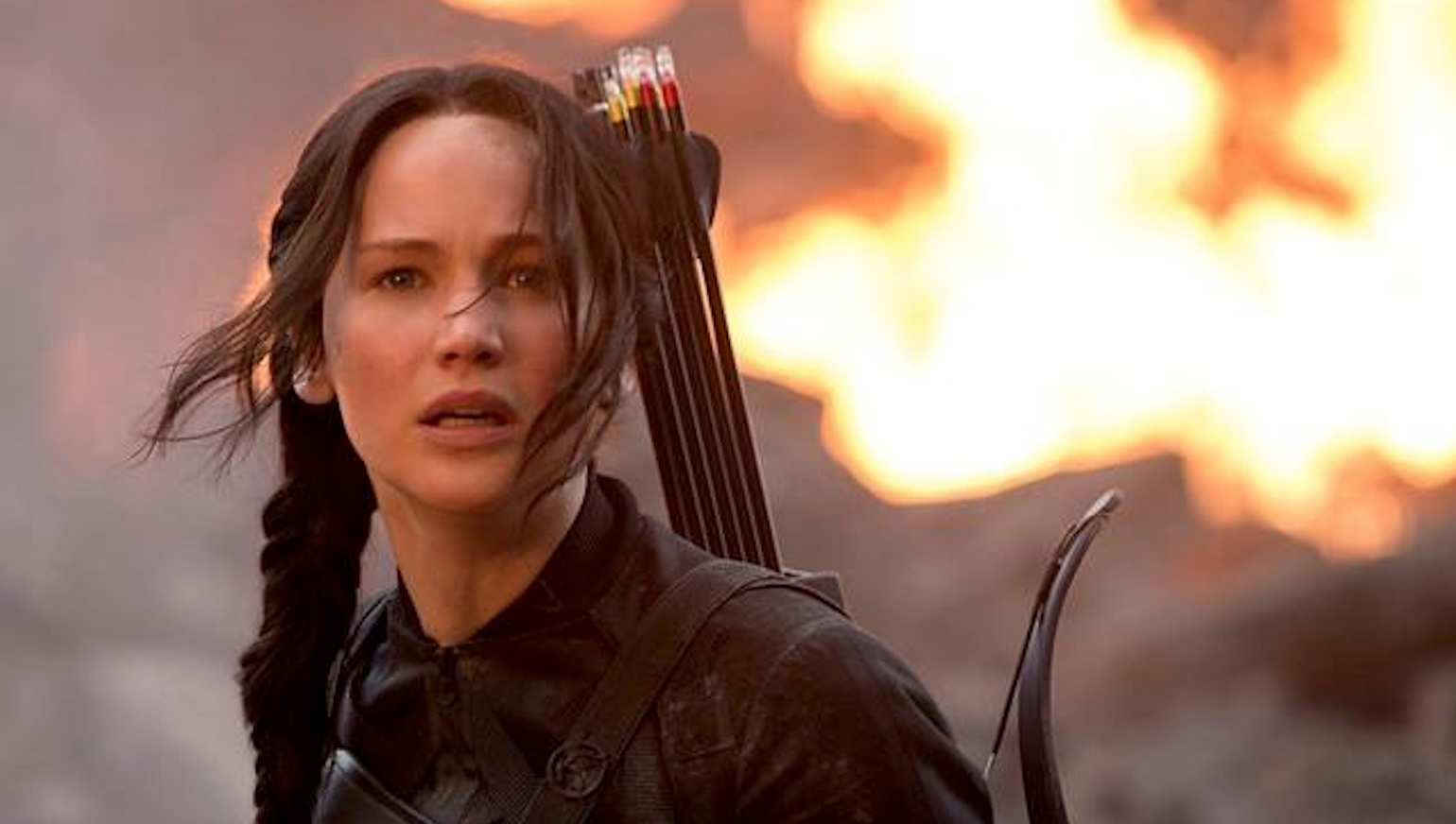

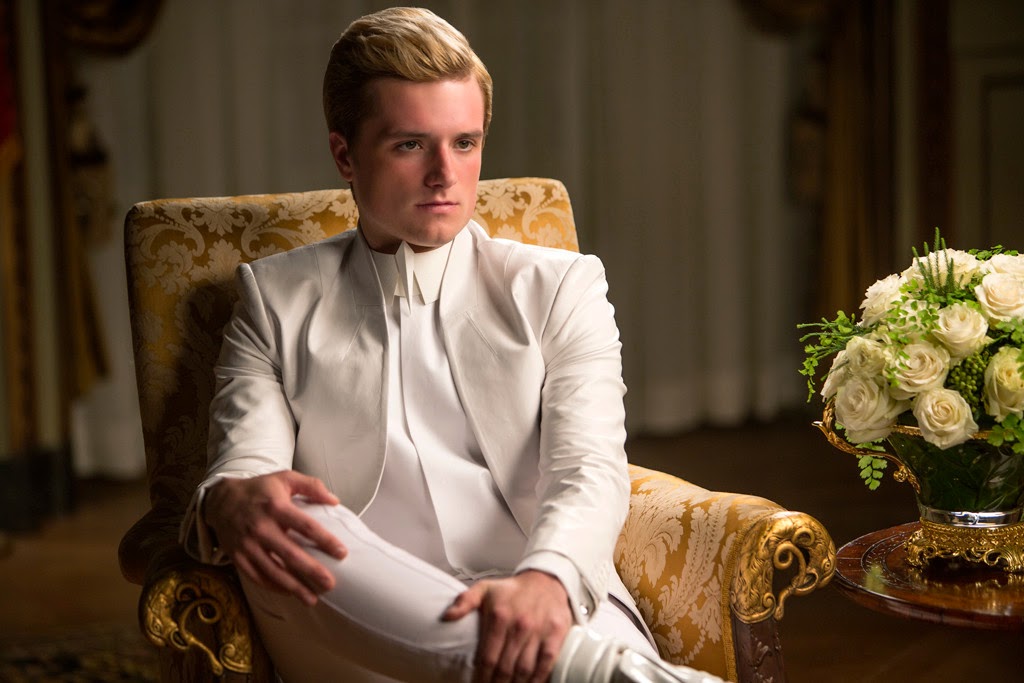
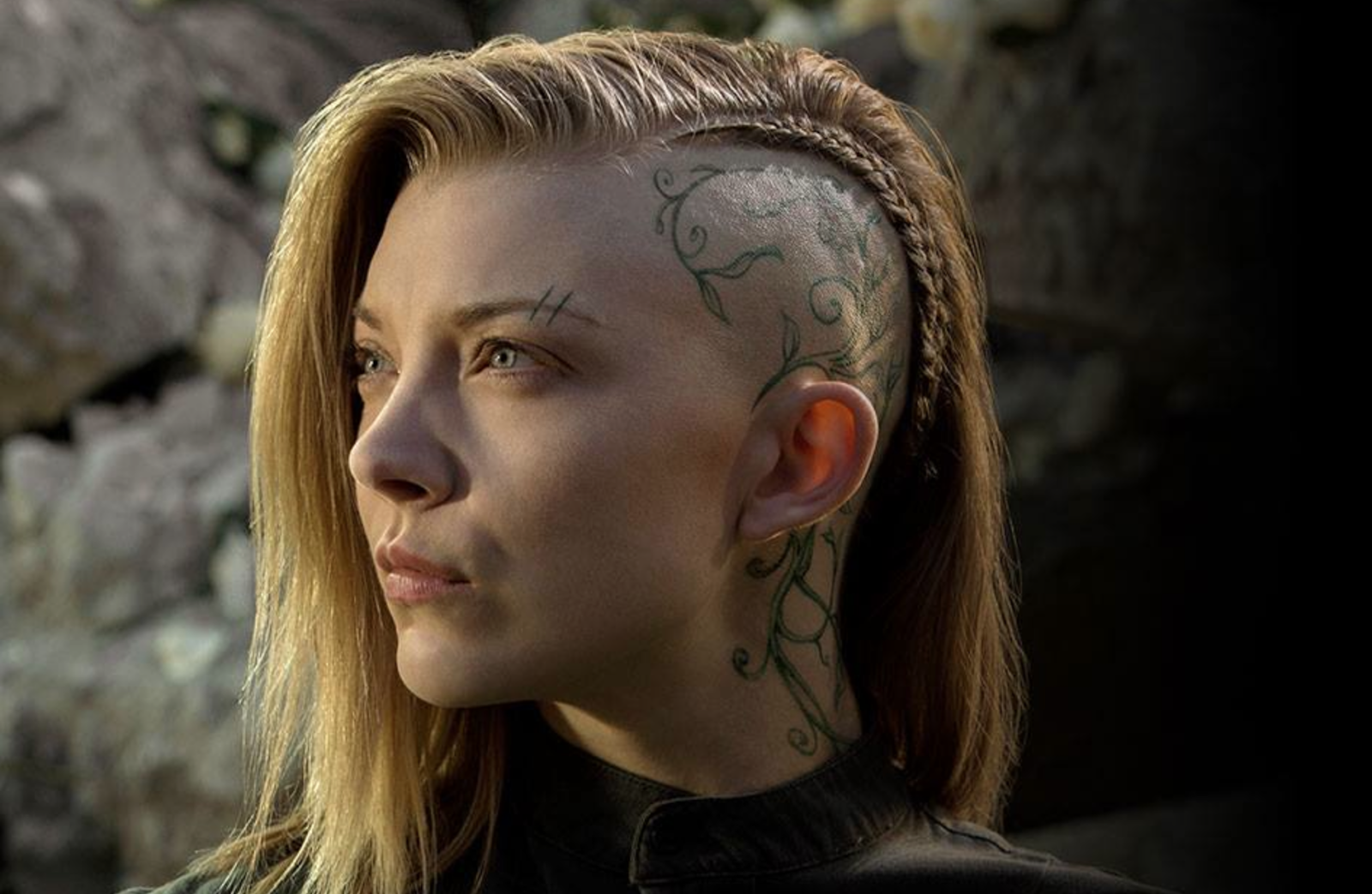
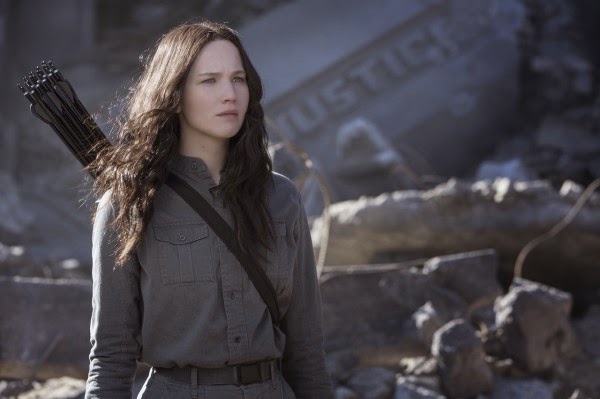
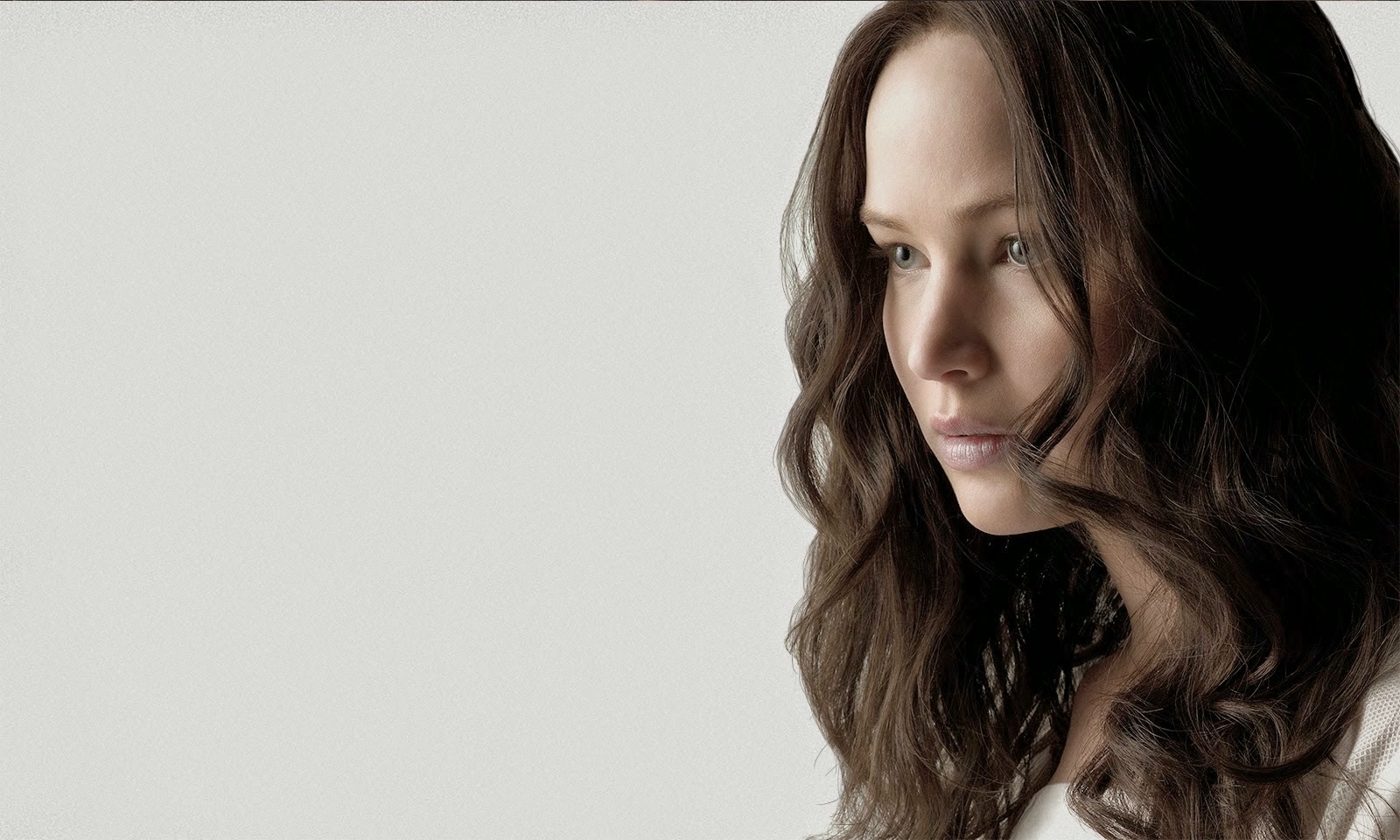

I confess that I haven’t read the books. I did see the first two movies after they came out on DVD. I was already thinking that I might see this movie in the theaters but now, after reading this review, I definitely will. It is good to know that this movie is one of the rare action movies with depth.
ReplyDeleteYou should definitely see it in theaters. Totally worth it.
DeleteIt's easy to dismiss that as a crass business decision - after all, you can make a lot more money off two movies than one - but I think in this rare case it's worked out for the best.
ReplyDeleteBooks adapted to film frequently have material that is better off cut - film doesn't have a lot of narrative room compared to books or TV. But the last book in a series - at least in a good series - is firing a lot of Chekhov's guns. There's less that can be taken out. So I'm generally sympathetic to the decision to split it.
She will be their Mockingjay, if they agree to pardon Peeta and the other Victors when they're rescued.
I'm very keen on the fact that she's as adamant about the other two as she is about Peta.
Or, as Haymitch points out, people like her for something she did that was unscripted. Like volunteering for Prim or mourning Rue.
This was one of my favourite moments, when Effie brings up volunteering for Prim. Because her reaction in the first film was unutterably fake, even though - going by this one - it was a copy of her real feeling. It's a telling aspect that the Games reduce even a moment of being truly moved to a lie.
War is not fun. It's bloody and messy and horrible. We're not allowed to forget that here. It's like the film is saying, "You wanted a revolution? Here you go. I hope it's what you were prepared for."
I also like how we get to see two important battles being fought entirely by no-names. Partly because we get to see how Katniss is affecting people, beyond her proximity, but also because it makes these people unambiguously matter as more than a backdrop for Katniss.
Another of my favourite moments is when Katniss is reluctant to enter the hospital, clearly doubting not just her ability but her *right* to stand as a symbol next to these people. When they give her the "Rue" signs it's a comfort, because Rue's memory is something she can hold on to. But it's also terrifying, because this is the moment where she gives up the ability to ever turn back.
Jennifer Lawrence is really doing Oscar level work here - she plays Katniss with a sensitivity and blunt fear that makes her amazing to watch.
Ian McKellan once said - in the year he won his own Oscar - that it's parts that win rather than actors. I think there's a lot of truth to that, which is also why I suspect Lawrence won't be winning (or even nominated) for this.
Oh man, I love that Katniss is all about understanding and helping the other Victors. I love that she doesn't even specify which other Victors. Technically she includes even Victors she doesn't like, like Enobaria. And I love that.
DeleteEffie is, to me at least, one of the most interesting characters in the story. I find her so fascinating, because hers is the part of the story we really don't here: the misinformed people of the Capital coming to a greater awareness.
I love that Katniss is uncomfortable going into the hospital. That she's not easily made into a symbol and has trouble understanding why/if her presence would even be welcome. She would be a disingenuous figure if she took to it easily, so I like that she was hesitant.
Yeah, she probably won't be nominated. But a girl can dream!
KOLKATA ESCORT
ReplyDeleteKOLKATA ESCORT SERVICE
KOLKATA INDEPENDENT ESCORTS
KOLKATA INDEPENDENT ESCORT
ESCORT IN KOLKATA
ESCORTS IN KOLKATA
VILLAGE CALL GIRLS
VILLAGE CALL GIRL
CALL GIRL
CALL GIRLS
ESCORT
ESCORTS
KOLKATA FEMALE ESCORTS
KOLKATA HOTEL ESCORTS
KOLKATA MODEL ESCORTS
KOLKATA CALL GIRL
KOLKATA CALL GIRL SERVICE
KOLKATA CALL GIRL SERVICE
KOLKATA CALL GIRLS
CALL GIRL
CALL GIRLS
CALL GIRLS SERVICE
CALL GIRL SERVICE
KOLKATA INDEPENDENT CALL GIRLS
KOLKATA INDEPENDENT CALL GIRL
ESCORT
KOLKATA INDEPENDENT MODEL ESCORTS
KOLKATA CALL GIRLS ESCORTS
KOLKATA CHEEP ESCORTS
KOLKATA CALL GIRLS NUMBER ESCORTS